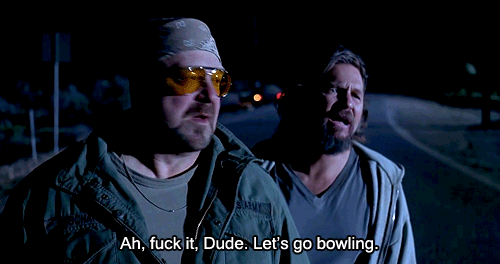A few weeks back, I wrote about the pros and the cons of having a bucket list, with one of the dangers being that it can turn enjoyable experiences into another long workstream of tasks to be completed. And given our bucket lists tend to be grandiose and hard to complete (Visit Australia! Attend a football World Cup final!), they tend to fester as a reminder of all the things that we’d be doing if we weren’t so busy with our everyday lives.
Still, there’s something to be said for knowing how you’d like to be spending your free time - especially if you pair it with making sure that you actually do it.
Introducing: The F***-It List
Having a F***-It List is an idea that was introduced to me by my wife (and I’m sure it’s only a tangential coincidence that there’s also a book and a Netflix movie of the same name). Think of it this way: if a Bucket List is all of the things that we want to achieve before we’re on our deathbed, then a F***-It List is the same on a much smaller scale.
- What are the things that you really want to get done this year? (Note that this is vastly different to a New Year’s Resolution, which tends to be much more focused on establishing a new habit, or doing something repeatedly.) For instance: “I want to see the summit of Mount Snowdown.”
- What are the things that you want to achieve this month, or before next pay-day? For instance: “I want to see the upcoming new Marvel film on an IMAX screen.”
- What are the things that you want to achieve this week? For instance: “I’d like to attend the craft beer tasting night at one of my local pubs.”
Even when we think of relatively small-scale goals like this, our minds immediately go into overdrive to tell us why we won’t be able to do them. “We’ll have to find a babysitter”, or “I’ll have to also get a hotel if that’s going to work”. It’s our brain’s way of coaching us to avoid disappointment, by conditioning us to assume that enjoyable tasks are unattainable. But what if we just ignored the nagging doubts?
Bring on the good times
If our everyday wants are small enough, without much in the way of a financial burden, the “worst that can happen” is actually relatively small, compared to the boost to your energy and wellbeing that you can gain in return. (Although be careful of physically draining activities when you’re already feeling tired - they may compound the way that you’re feeling.)
If you’re in a relationship, then you’ll have some added super-powers here. For as much as there’ll certainly be activities that you want to undertake together, you probably each have your own individual desires of little things that you’d like to do. Take turns to tick items off your lists, enabling your partner by removing potential blockers, for instance by providing childcare or by waiting in for the plumber on their behalf.
Note this is different to taking a “Yes Man” approach to life. This isn’t saying that you should say yes to everything, but it’s certainly saying that you shouldn’t say no to things that you want to do. After all, what’s life if we can’t do a little living?
Key takeaways 📝
- If your desires are small-scale enough, there’s little to stop you from doing them.
- Learn to silence unnecessary doubt inside your head.
- Live a little!

